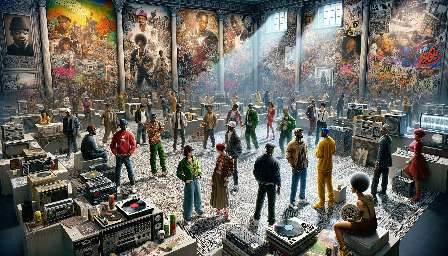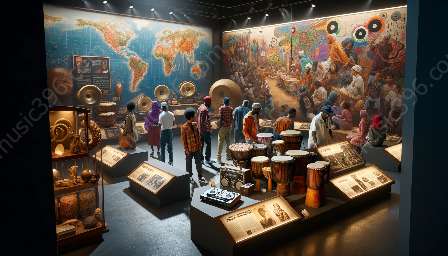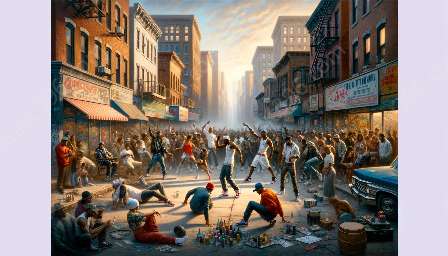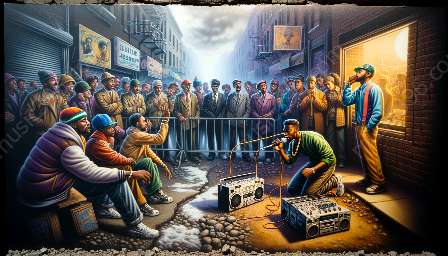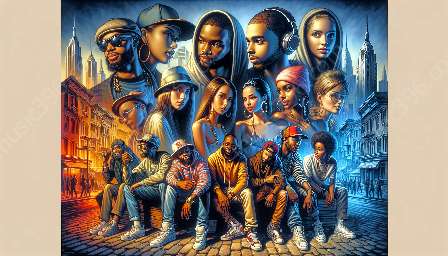Hip-hop music has been a powerful force in urban culture and society, shaping and reflecting the dialects and languages of the inner-city communities where it originated. This topic cluster explores the rich history of language and dialects in hip-hop, how they have evolved, and their impact on urban and hip-hop music.
History of Urban & Hip-Hop Music
The history of urban and hip-hop music is deeply intertwined with the language and dialects of the communities that birthed this cultural phenomenon. Urban music, encompassing various genres such as jazz, blues, and gospel, played a pivotal role in the development of hip-hop. Originating in the Bronx, New York City, hip-hop emerged as a way for marginalized communities to express their struggles, aspirations, and experiences through art, dance, and music. The language and dialects used in hip-hop were a direct reflection of the diverse, multicultural, and often economically disadvantaged neighborhoods where it thrived.
Language and Dialects in Hip-Hop
Evolution and Influence
In the early days of hip-hop, language and dialects served as a means of communication and community building among urban youth. Artists used their own vernacular and idiomatic expressions, often incorporating elements of African American English, Spanglish, and local slang into their lyrics. This linguistic tapestry reflected the lived experiences of inner-city residents and fostered a sense of belonging and cultural identity within the hip-hop community.
As hip-hop gained mainstream popularity, its influence on language and dialects expanded beyond the confines of urban neighborhoods. The distinctive cadences, wordplay, and storytelling embedded in hip-hop lyrics began to permeate popular culture, shaping the way people across the globe spoke and expressed themselves. This linguistic impact was particularly pronounced in youth culture and the evolution of urban colloquialisms.
Regional Dialects and Sub-genres
The language and dialects in hip-hop have also been shaped by regional influences, giving rise to distinct sub-genres and styles within the music. From the East Coast to the West Coast, the Dirty South to the Midwest, each region has contributed its unique linguistic flavor to hip-hop. Artists, such as the Notorious B.I.G. representing the East Coast and Tupac Shakur from the West Coast, showcased their regional dialects and vernacular in their music, infusing their lyrics with the authenticity and rawness of their respective locales.
Furthermore, the proliferation of hip-hop culture globally has led to the emergence of international dialects within the genre. Artists from countries as diverse as the United Kingdom, France, and Japan have incorporated their native languages and dialects into their hip-hop music, resulting in a rich tapestry of global linguistic expression within the genre.
Urban & Hip-Hop
Social and Cultural Impact
The language and dialects of hip-hop have played a pivotal role in shaping urban culture and society. Hip-hop music has been a platform for expressing the struggles of urban life, addressing social issues, and advocating for change. The lyrical content, often delivered in the artists' authentic vernacular, provides a raw and unfiltered portrayal of urban realities, resonating with audiences who can identify with the experiences depicted in the music.
Beyond its artistic expression, hip-hop has served as a catalyst for linguistic empowerment and cultural pride within urban communities. By celebrating and preserving local dialects and linguistic innovations, hip-hop has elevated the voices and narratives of marginalized groups, challenging mainstream linguistic norms and amplifying the richness of urban linguistic diversity.
Influence on Popular Culture
The influence of hip-hop language and dialects extends beyond the confines of urban communities, permeating popular culture and shaping contemporary linguistic trends. From the adoption of hip-hop slang and lexicon in mainstream media to the influence of urban vernacular on fashion, street art, and entertainment, hip-hop has left an indelible mark on global cultural expression.
Moreover, the dissemination of hip-hop music through digital platforms and social media has accelerated the spread of urban language and dialects, transcending geographical boundaries and connecting diverse communities through a shared linguistic heritage.
Conclusion
Language and dialects have been integral to the evolution and impact of hip-hop music. From its urban origins to its influence on global culture, the language and dialects of hip-hop reflect the diversity, resilience, and creativity of urban communities. As hip-hop continues to evolve, its linguistic legacy serves as a testament to the enduring power of language in shaping identity, expression, and social change.




